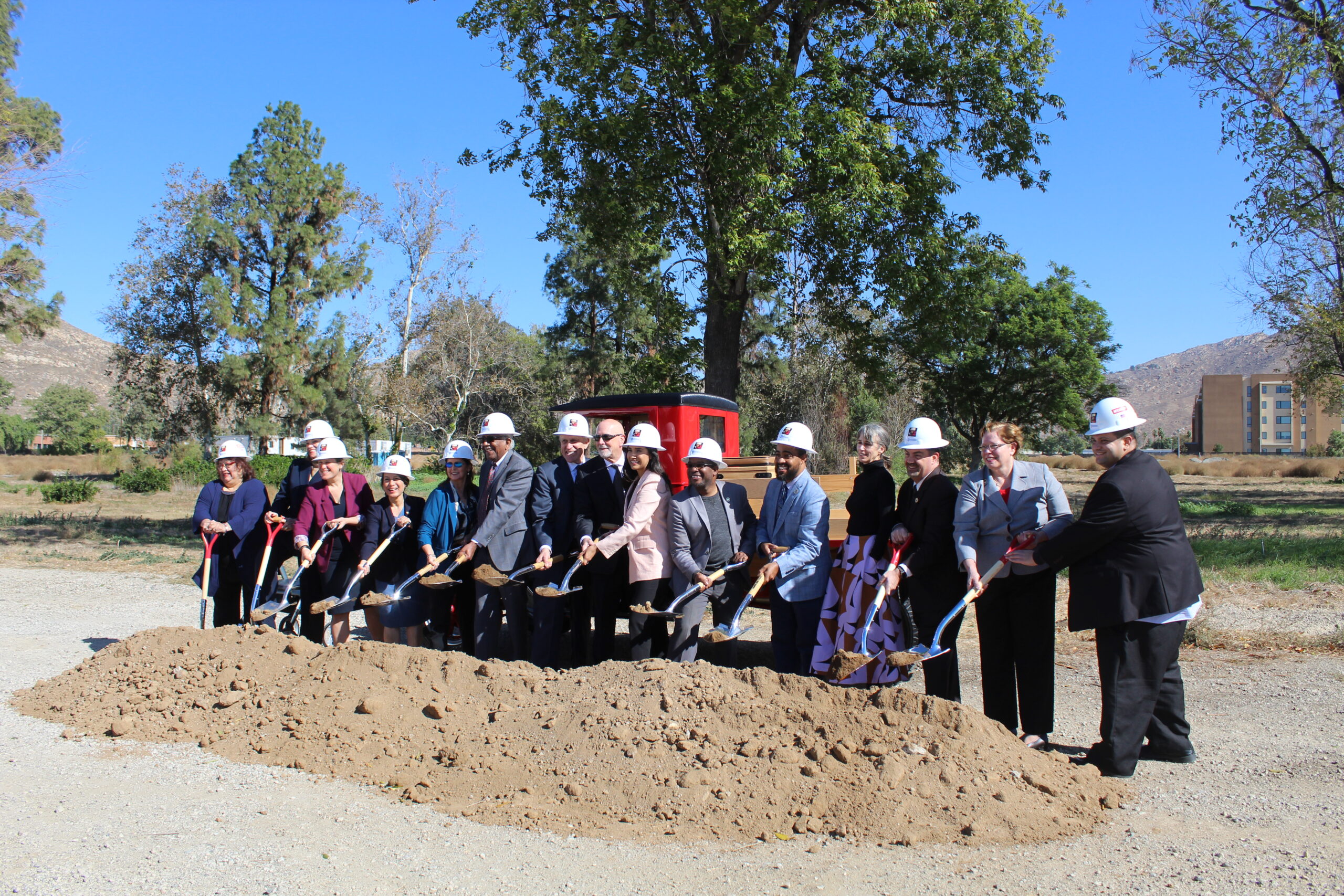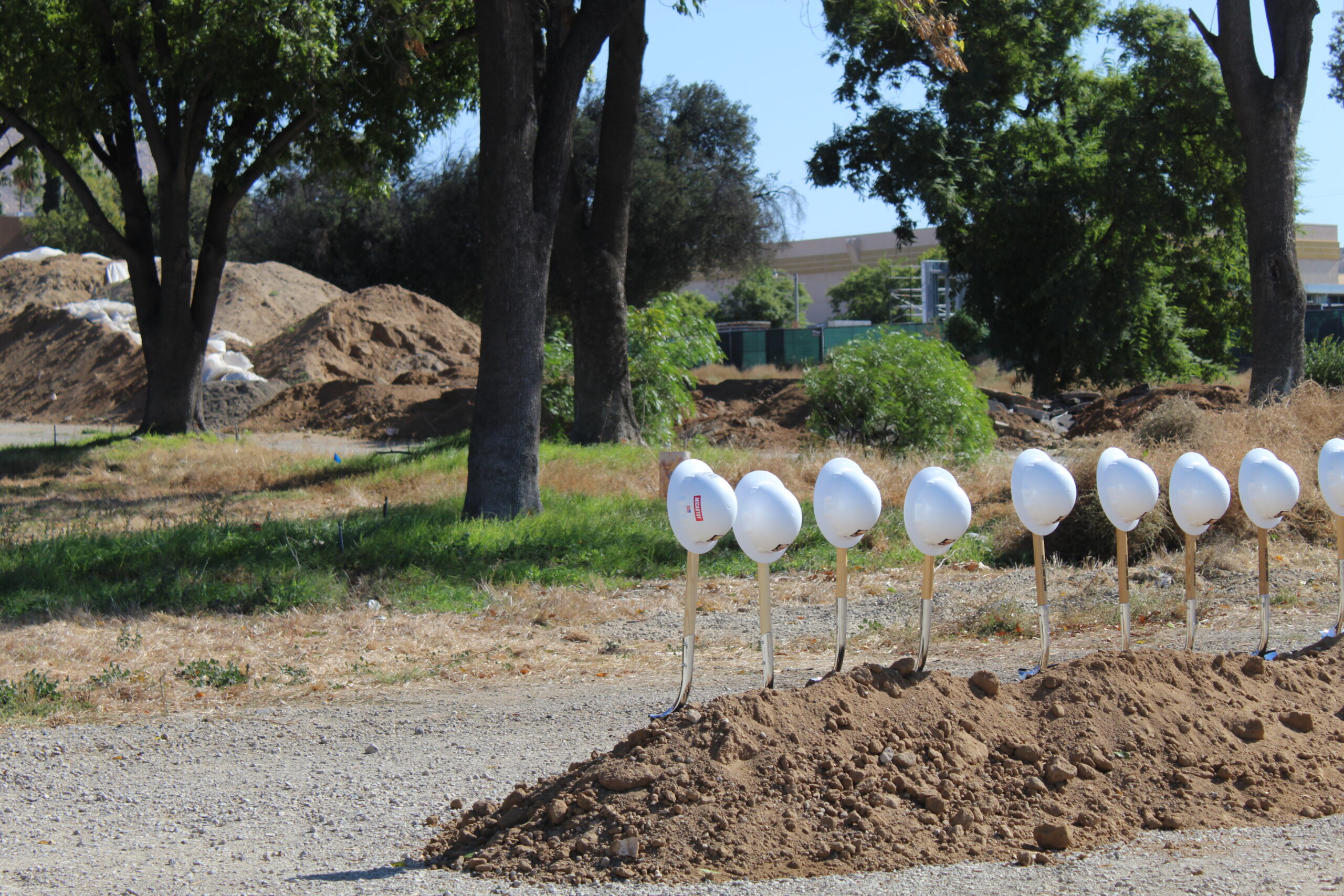
Senna Omar / The Highlander
On Wednesday, Nov. 4, ground was broken for North District Phase 2, a new student housing complex located north of the original North District project. Gusty winds marked the occasion, as did speeches from the mayor of Riverside, the Riverside Community College District (RCCD) Chancellor Wolde Ab-Isaac, UCR Chancellor Kim Wilcox and others. The groundbreaking kicked off the beginning of construction on a $347.78 million project in collaboration with the RCCD. North District Phase 2 will include two apartment-style buildings housing 1568 new beds, 326 of which are for RCCD students, and new recreational areas.
Heidi Scribner, the Associate Vice Chancellor for Auxiliary Services, sees North District Phase 2 as a step in addressing the demand for housing on campus. “We do see the demand [for housing] continuing to hold strong and increase, and in order for us to meet that, we need to continue to develop.” Auxiliary Services include Housing, Dining, Hospitality, Transportation and Parking, Early Childhood Services and Campus Business Services.
Scribner began working at the University of California, Riverside, in 2021 when Dundee and North District had first opened due to a partnership with American Campus Communities (ACC) the previous year. Dundee is considered a private-public partnership, or P3; in this type of partnership, the campus ground-leases the property, and ACC owns the building until the school pays it back. These are multi-year-long contracts where the rent that students pay goes towards paying back the construction costs for the building. In combination with the two ACC properties, approximately 2,300 beds were opened, which, according to Scribner, is “a significant number at once.”
Like Dundee and North District, North District Phase 2 was originally a P3 partnership with American Campus Communities; however, UCR decided to take the project in a different direction, opting to go through the Higher Education Student Housing Grant Program (SB169). The Higher Education Student Housing Grant Program is a three-year state student housing program designed to provide “one-time grants for the construction of student housing or for the acquisition and renovation of commercial properties into student housing for the purpose of providing affordable, low-cost housing options for students enrolled in public postsecondary educational institutions in the state, including community colleges.” UCR, in collaboration with RCCD, managed to receive $120.6 million from the program in order to develop student housing over the next three years.
North District phases one and two are both part of The North District Development (NDD) Plan which is a long-range development plan. This means that the project will be completed in multiple phases. “The NDD Plan designates land uses for the entire 55‐acre site … The NDD Plan includes a mix of land use designations that would allow for the construction of student housing units (for first-year, second-year, transfer and upper-division undergraduate and graduate students), support spaces, site improvements, utilities and supporting infrastructure improvements, dining facilities, recreational fields, an athletic field and related parking.”
According to Scribner, “we continue to see very high demand” for student housing, “especially coming out of the pandemic much of the housing in the private market had increases in rent.” Scribner continued, “We believe that students should live with us, at least for a year. It’s a great experience. You get to meet a lot of people, and we offer a lot of services and support and proximity.”
The partnership between RCCD and UCR means that of the 1568 beds in the new development, some are reserved for RCCD students. To facilitate the new logistics of the development, RCCD and UCR have partnered on a work group to develop the student experience for North District Phase 2. “Our Student Affairs [and RCCD’s] student life are on a workgroup that we’re getting ready to kick off with key representation [from] the areas that touch student life,” explains Scribner. “They’re going to be working together on what the program looks like [and] what the student experience looks like.” However, the day-to-day operations will be handled by UCR, “we’re running the construction, we will be managing like we do for all of our housing; we’ll be handling the administration, the facility, upkeep, the cleaning, et cetera,” says Scribner.
According to Scribner, RCCD students will not be located in just one area of the new development but instead will be “dispersed out through the community.” Scribner hopes that this community model will help RCC students “see what it’s like to be at a four-year campus [and] hope to transfer.”
When asked for a statement, Chancellor Kim A. Wilcox said, “UCR and RCC have a long history of collaboration and support. Many RCC students transfer to UCR to continue their education. We also work together to improve student success throughout the region. The North District project builds on our partnership and continues our work of supporting student success. By providing housing, we remove one of the possible barriers to pursuing an education for both UCR and RCC students. Additionally, providing RCC students the opportunity to live on the UCR gives them a chance to envision how they would succeed if they transfer to UCR to complete their degrees.”
While RCCD and UCR students will be living side by side in North District Phase 2, whether the partnership will continue in other aspects of campus life is still uncertain. “There are other questions of could [RCCD students] use this, attend this? And we need to work that out,” states Scribner. “Because our students pay specific fees for some of those things…we’re not going to add burden to our students. But we don’t want people left out because we’re trying to create a more holistic community.”
Still, Scribner believes the partnership between RCCD and UCR was important for the feasibility of the project itself. “The community college brought money to the table, quite truthfully,” Scribner explains. “By doing a joint partnership, we were able to get 126 million to put towards this. Where without a partnership, we would have been eligible for much less.”
As the project moves forward, Scribner hopes students will continue to be invested in the process. “How the North District program may look right now, with the RCC, might seem a little odd,” says Scribner. “But there’s a lot of opportunity for our students to be involved to help shape it.”
Construction for North District Phase 2 is not expected to be complete until August 2025. However, this construction is not the end of development plans in the North District lot. According to Scribner, “We do plan to continue to develop North District … So there will be a North District Three.”









